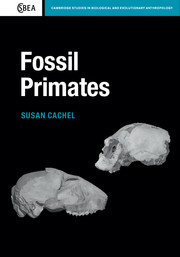Book contents
- Frontmatter
- Dedication
- Contents
- Acknowledgments
- Preface
- 1 Introduction: primates in evolutionary time
- 2 Primate taxonomy
- 3 Fossils and fossilization
- 4 The world of the past
- 5 The lifeways of extinct animals
- 6 Evolutionary processes and the pattern of primate evolution
- 7 Primate origins
- 8 The Paleocene primate radiation
- 9 The Eocene primate radiation
- 10 The Malagasy primate radiation
- 11 The Oligocene bottleneck
- 12 Rise of the anthropoids
- 13 The platyrrhine radiation
- 14 The Miocene hominoid radiation
- 15 The cercopithecoid radiation
- 16 Late Cenozoic climate changes
- 17 Conclusions
- References
- Index
11 - The Oligocene bottleneck
Published online by Cambridge University Press: 05 April 2015
- Frontmatter
- Dedication
- Contents
- Acknowledgments
- Preface
- 1 Introduction: primates in evolutionary time
- 2 Primate taxonomy
- 3 Fossils and fossilization
- 4 The world of the past
- 5 The lifeways of extinct animals
- 6 Evolutionary processes and the pattern of primate evolution
- 7 Primate origins
- 8 The Paleocene primate radiation
- 9 The Eocene primate radiation
- 10 The Malagasy primate radiation
- 11 The Oligocene bottleneck
- 12 Rise of the anthropoids
- 13 The platyrrhine radiation
- 14 The Miocene hominoid radiation
- 15 The cercopithecoid radiation
- 16 Late Cenozoic climate changes
- 17 Conclusions
- References
- Index
Summary
The Oligocene epoch begins at 33.9 mya. Plate tectonic reconstructions demonstrate that, for the first time, the geography of the earth largely resembled that seen today. In particular, the Atlantic and Mediterranean basins had finally achieved a modern aspect (Figures 11.1 and 11.2). Discussions of anthropoid primate origins and dispersal (Chapter 12) center on these two ocean basins and sweepstakes or rafting events that cross these basins.
During two episodes that straddled the Eocene/Oligocene transition, the world abruptly shifted from a warm to a cold phase. These two episodes lasted a total of 300,000 years. The cold phase that began after this shift has persisted ever since. Antarctica, which had previously been ice-free, except for some areas in the high interior mountains, acquired a permanent continental ice sheet. The Oligocene itself was an epoch of global aridity. So harsh were conditions that global sea level was drastically lowered, and signs of blowing aeolian dust are found in ocean sediment cores worldwide.
Mammals have never recovered from the harshness of the Oligocene. For the first time since the beginning of the Cenozoic, the extinction rate of mammalian families exceeded their origination rate. At the beginning of the Oligocene, 95 families of mammals exist. These fall to 77 families by the end of the epoch. Mammal diversity was thus reduced by 19 percent in only 11 million years—a severe reduction from which the class has never recovered. In Europe, the mammal turnover during the Eocene/Oligocene transition was so marked that it was noted over a century ago by the paleontologist Hans Stehlin (1909), who labeled it "La Grande Coupure" (“The Big Cut”). There are also significant mammal extinctions during the Eocene/Oligocene boundary in Asia. Here the extinction event is labeled “The Mongolian Remodeling” (Meng & McKenna, 1998; Hartenberger, 1998).
- Type
- Chapter
- Information
- Fossil Primates , pp. 174 - 178Publisher: Cambridge University PressPrint publication year: 2015



